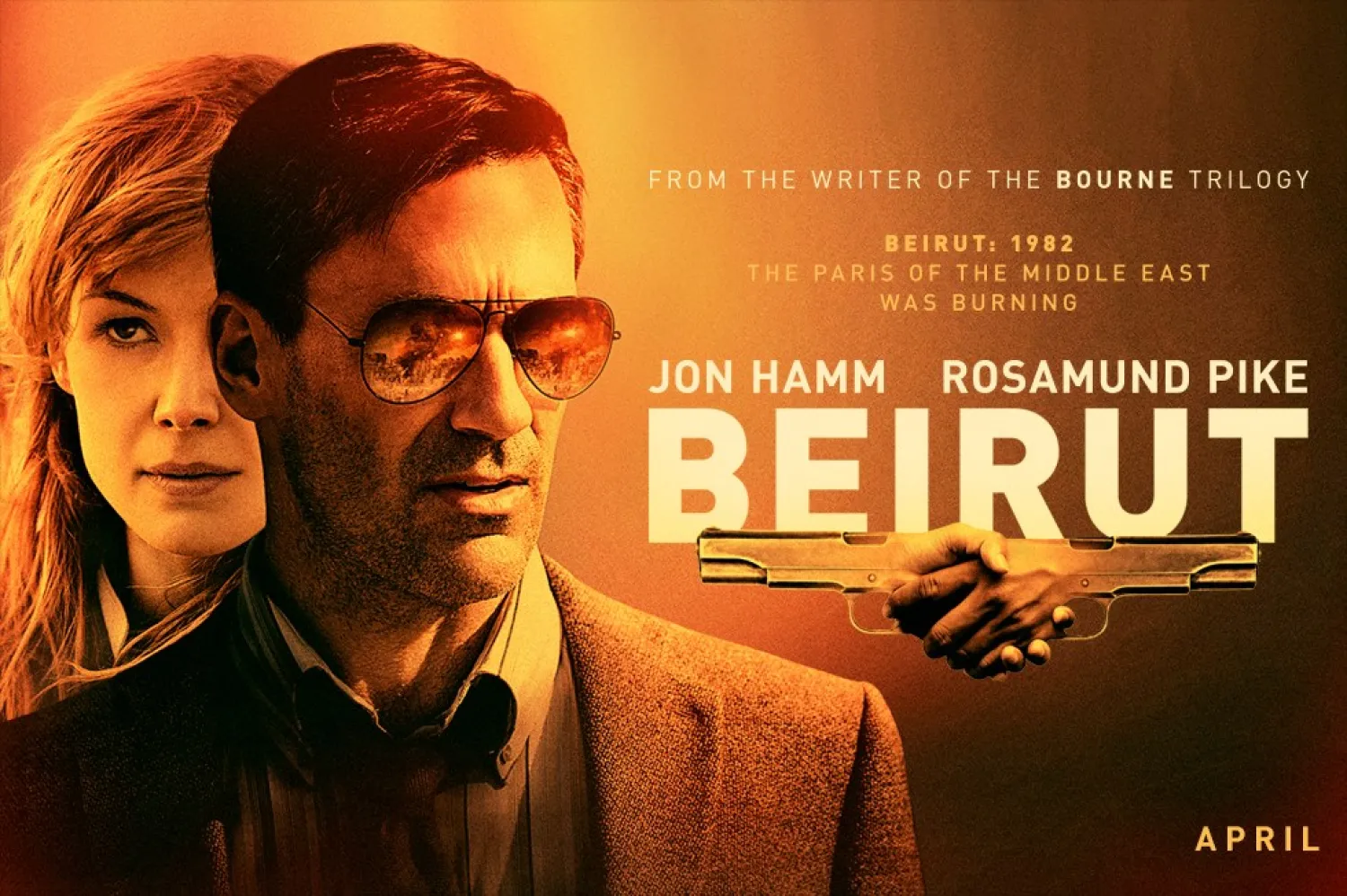No sooner had the trailer of the Hollywood movie “Beirut” been released that social media was in uproar with calls for its ban in Lebanon.
The movie, shot in Morocco in 2016, is directed by Brad Anderson and tells the story of an American diplomat, played by Jon Hamm, who left Beirut in 1972 following his family’s death. He is called back to the city by the CIA ten years later in order to rescue a friend, who was kidnapped by an extremist group.
The screenplay was written by Tony Gilroy and audiences are familiar with Hamm, who earned critical acclaim for his starring role in the TV show “Mad Men”. The movie also stars Rosamund Pike, who earned an Oscar nomination for her starring role in the 2014 movie “Gone Girl”.
The 150-second trailer of “Beirut” depicts a city that has been destroyed by the country’s 1975-90 civil war. Images of explosions and gunmen are contrasted with images of children playing with plastic guns. Others show heavy tanks and weapons and buildings ravaged by war. A short scene in particular stoked anger across social media in Lebanon for depicting a very rudimentary sign indicating “Beirut Airport”. Vegetable vendors were also shown at the facility in a scene that social media users said did not accurately reflect the reality at the time. Others slammed the “Beirut Airport” sign, saying that their country’s airport had never been depicted in such a poor manner.
The movie has been described as “scandal” by Lebanese people, pointing out that not a single aspect of the movie is Lebanese, neither the cast, the accents, soundtrack or actual location.
Culture Minister Ghattas Khoury was the first to condemn the movie’s depiction of the Lebanese capital, while a campaign has been launched on social media to ban the film.
One activist asked on Facebook: “‘Welcome to Beirut’ … How can this be the opening line of a trailer of a movie that was shot in Morocco?”
Lebanese censors have not yet taken the decision on whether to release the movie in theaters on April 13, which ironically marks the anniversary of the eruption of the civil war. The censors have not yet received a copy of the movie.
Veteran Lebanese movie critic, Emile Chahine told Asharq Al-Awsat that the uproar over “Beirut” will ultimately help promote it even if it was not release in Lebanon.
“We will definitely not accept the release of a movie that harms Lebanon’s image. More importantly however, it should be banned worldwide because its reflects a negative image of our country.”
The calls for the ban of “Beirut” comes after Lebanon banned "Jungle", a survival drama about Israeli adventurer Yossi Ghinsberg, who got lost in an uncharted part of the Bolivian Amazon in 1981.
The film, starring Daniel Radcliffe, had been screening for two weeks in Lebanon but is now being pulled, a General Security official said on condition of anonymity, explaining that the decision followed a number of complaints.
In May, Lebanon banned the “Wonder Woman” movie because its lead actress, Gal Gadot, is an Israeli.
On Wednesday, and in a rare reversal, Lebanon’s Interior Ministry announced that Steven Spielberg’s “The Post” will be distributed in theaters after overturning a ban by the General Security authority, a senior official said.
The security body had on Monday announced it was banning the Hollywood thriller to comply with an Arab League boycott targeting supporters of Israel.
The Interior Ministry however chose not to sign off on the decision by General Security, which in addition to controlling Lebanon's borders, is responsible for censoring films, plays, and books.
"Interior Minister Nohad Mashnouq is going to allow the film to be shown," a senior ministry official told AFP.
The company distributing the film in Lebanon confirmed that the film, starring Meryl Streep and Tom Hanks would be released in cinemas in Beirut and elsewhere on Thursday.
The acclaimed production tells the behind-the-scenes story of the 1971 publication by The Washington Post of the Pentagon Papers, which exposed the lies behind US involvement in the Vietnam War.









